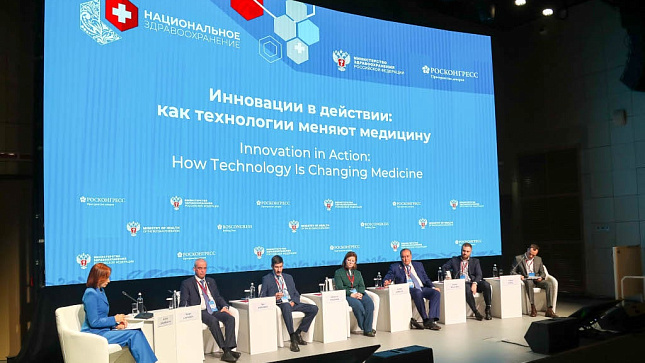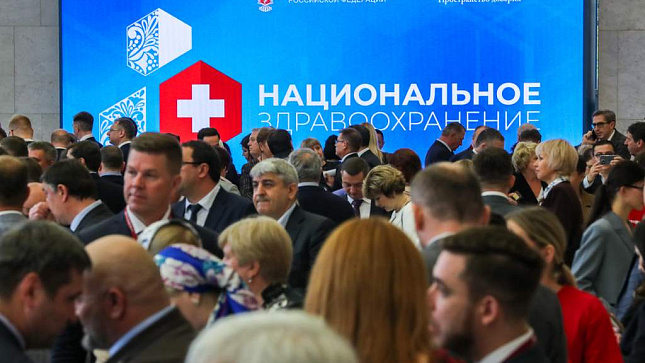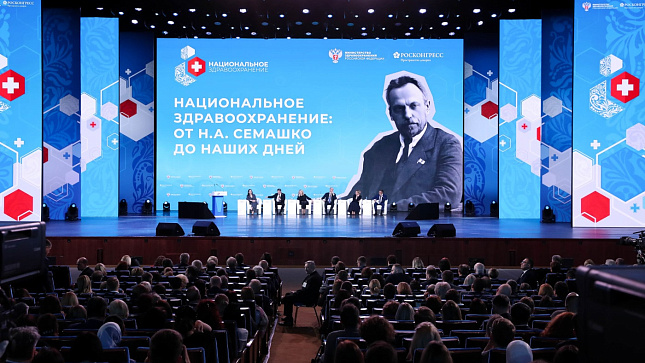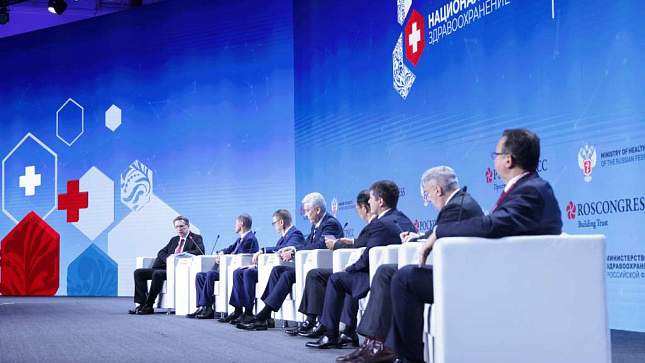
NATIONAL
HEALTHCARE 2025
Several Breakthrough Russian Technologies Presented at NATIONAL HEALTHCARE 2023 Congress
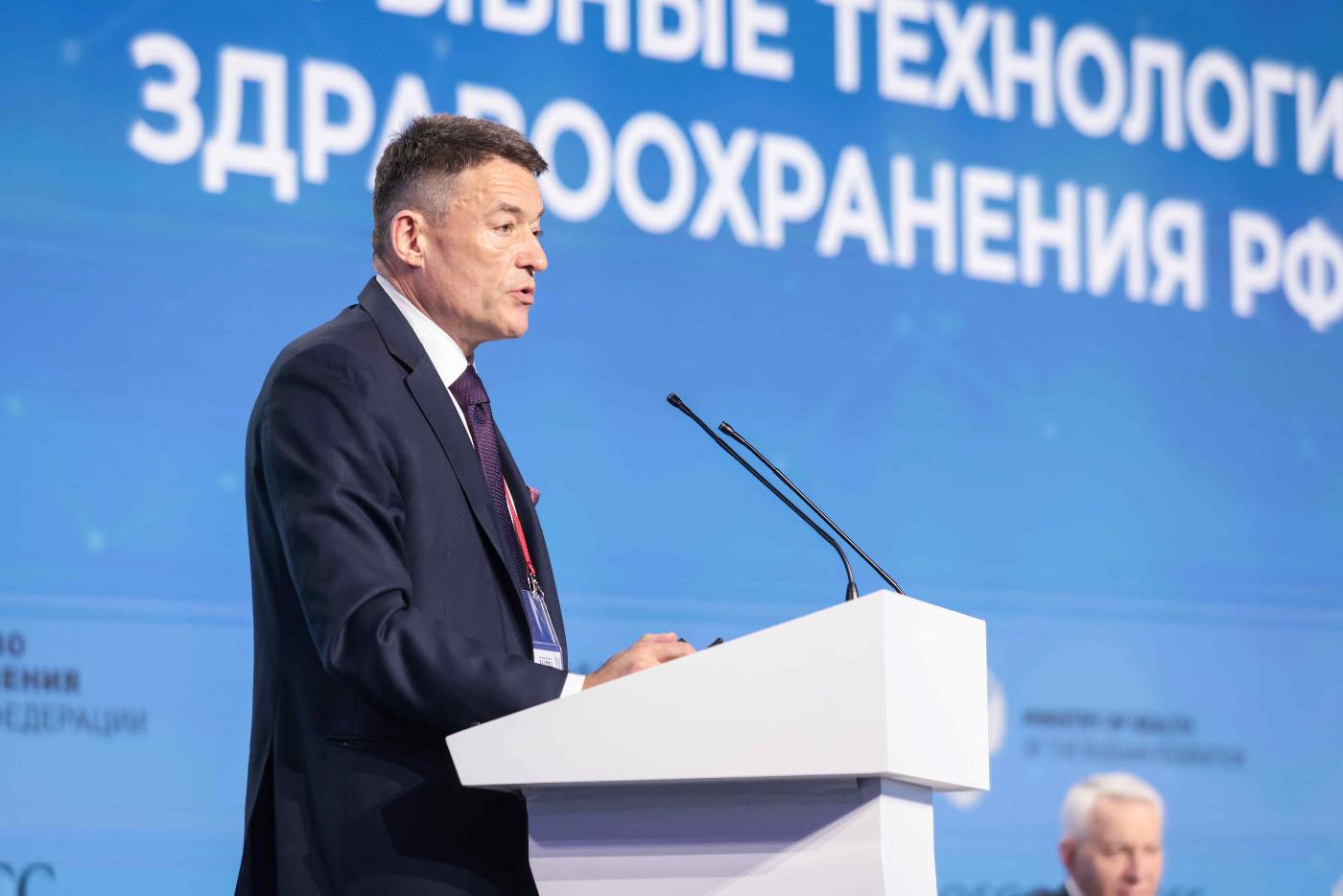
The Congress was organized by the Russian Ministry of Health and the Roscongress Foundation. The organizing partner of the event is the Russian Research Institute of Health of the Russian Ministry of Health. The Congress is being held as part of the International RUSSIA EXPO at VDNH.
During the key session of the first day of the congress – ‘Breakthrough Technologies in Medicine’, the heads of leading Russian scientific centres presented an overview of advanced technologies in their fields of medicine. The session was moderated by Russian Minister of Health Mikhail Murashko.
Experts spoke about technological innovations in terms of their impact on increasing life expectancy, enhancing the quality of life, and reducing mortality from the most dangerous diseases. A common trend for all specializations is the use of artificial intelligence, which helps in forecasting, diagnosing, and making medical decisions based on extensive arrays of patient data. The combination of big data and highly precise genetic analyses help to get a more accurate understanding of the clinical picture.
“Evidence-based medicine consists of average data for the average person, but we need individual data for a specific person: data on risk and prognosis factors. This will help with the transition to patient-centric, personalized healthcare. Of course, this will also change the actual technologies used to provide care: we will switch to bloodless tests, low-traumatic interventions, remote monitoring, new markers, and personalized prognosis plans,” Almazov National Medical Research Centre General Director Yevgeny Shlyakhto said.
In each of the medical fields that were presented, new domestic technologies and drugs are currently being developed, tested, and put into practice, some for the first time in the world. Scientists from the Pirogov Russian National Research Medical University, together with the company Biocad, have developed an innovative drug for the treatment of ankylosing spondylitis, which targets a small group of cells. The final, third phase of clinical trials is now being prepared. The drug should provide an opportunity for complete remission without side effects and could eventually become a platform for the treatment of other autoimmune diseases, in particular type 1 diabetes. This marks the first time in modern history that Russia has developed a first-in-class drug.
In 2024, the National Medical Research Centre for Haematology will begin clinical trials of the first Russian CAR-T drug. CAR-T is recognized as one of the most effective technologies in the world for the treatment of oncohematological diseases.
Scientists from the Kulakov National Medical Research Centre for Obstetrics, Gynaecology, and Perinatology conducted a pilot project to study the exome, identified more than a hundred gene mutations that are not yet in the international data bank, and found three new genes that had not previously been associated with monogenic diseases, thus making a substantial contribution to world medicine.
The Federal Centre for Brain and Neurotechnology of the Russian Federal Medical-Biological Agency is putting surgery with focused ultrasound into practice, which allows for the thermal destruction of a specific focus in the brain. In collaboration with the Rostec Corporation, the centre’s scientists have created a mobile device that can be used in any operating room and can target any layers of the brain. This is the first ultrasound device that uses domestic piezoelectric ceramic element.
The international medical community regards Russian surgeons as leaders in certain fields.
“The experience we have in pancreatic surgery is what we are known for around the world. We are also gaining experience in minimally invasive operations for hepatic resections. This allows our employees to participate in world expert consensus conferences on the development of treatment tactics for patients with tumours in this area,” Director of the Loginov Moscow Clinical Scientific and Practical Centre of the Moscow Healthcare Department Igor Khatkov said.
A key aspect of the discussion during the session was the incorporation of new technologies into widespread clinical practice: high-tech medical care should be available in all regions of the country.
“Our top centres are leaders in innovation. First, they fully develop the technology, including the preparation of licensing requirements, and then the technologies are distributed throughout the entire Russian Federation,” Russian Minister of Health Mikhail Murashko said.
A recording of the broadcast of the session ‘Breakthrough Technologies in Medicine’ is available on the website nzdrav.ru.
